Business Concept Proposal Samples
-
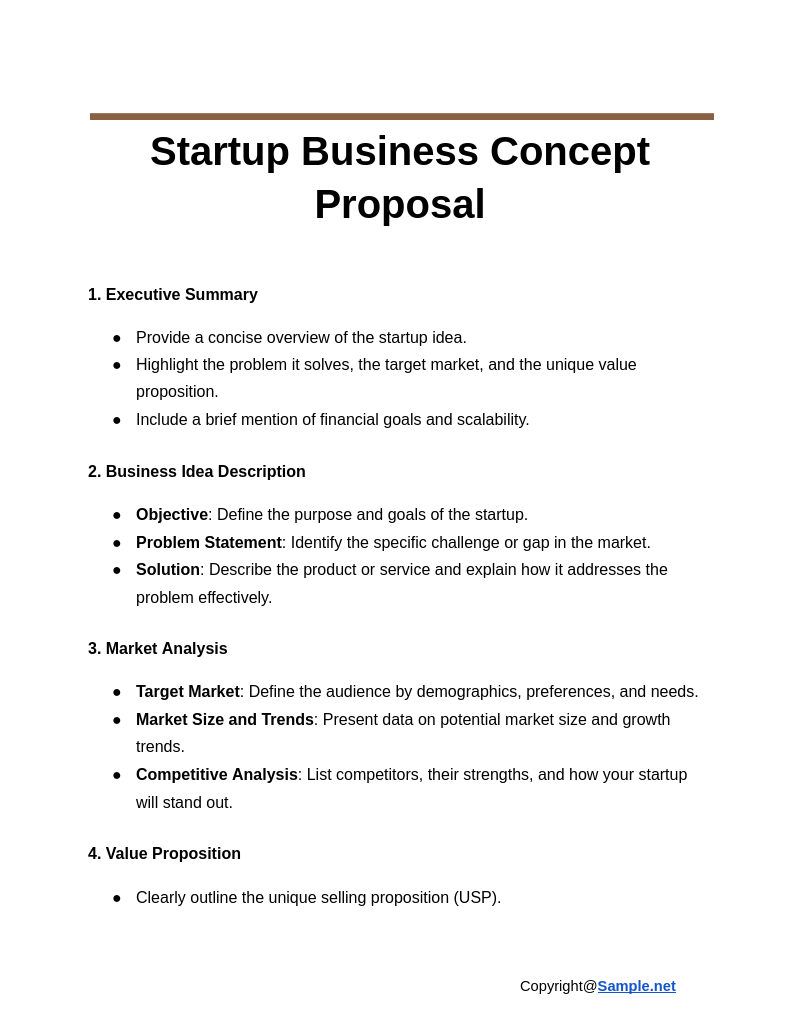
Startup Business Concept Proposal
download now -
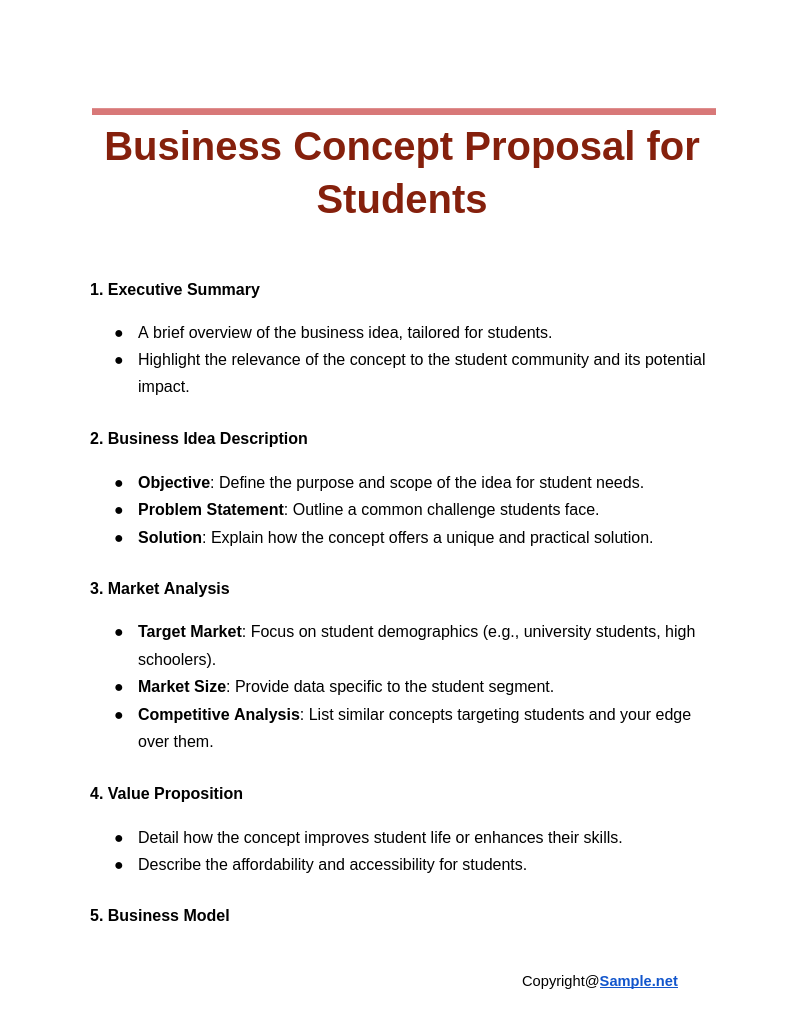
Business Concept Proposal for Students
download now -
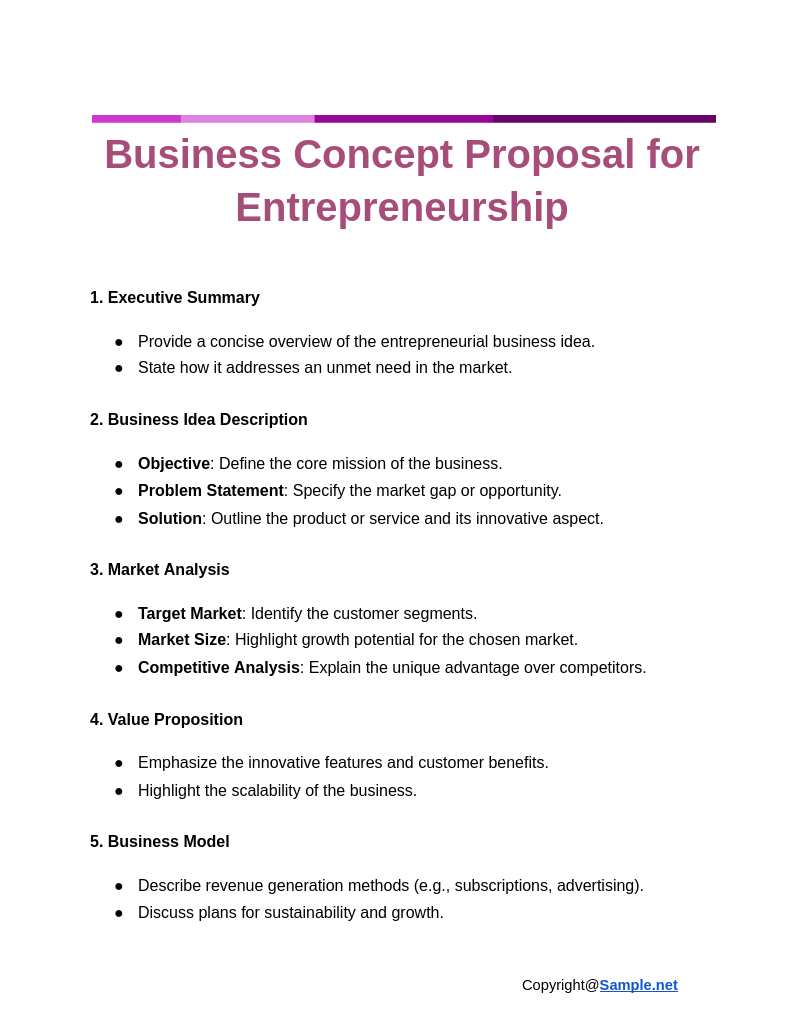
Business Concept Proposal for Entrepreneurship
download now -
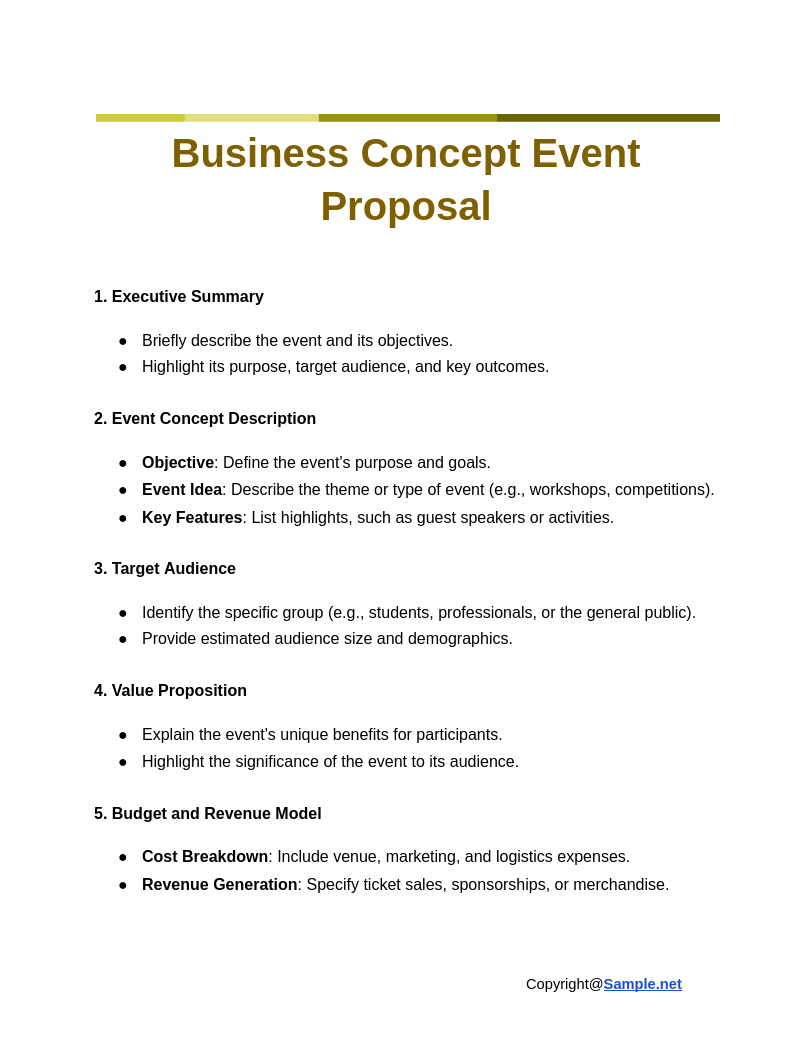
Business Concept Event Proposal
download now -
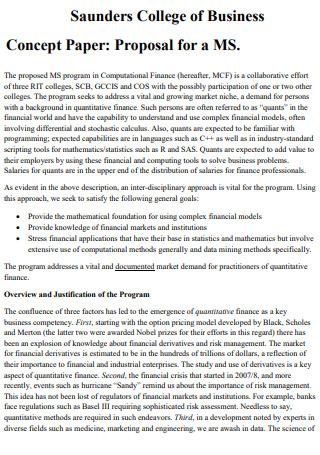
Business Concept Paper Proposal
download now -
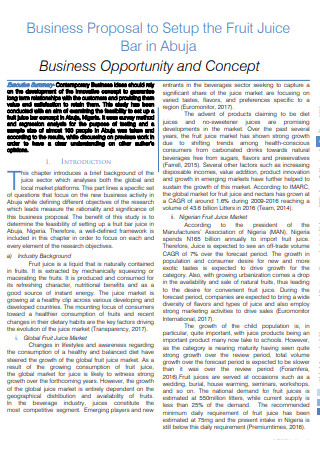
Business Opportunity Concept Proposal
download now -
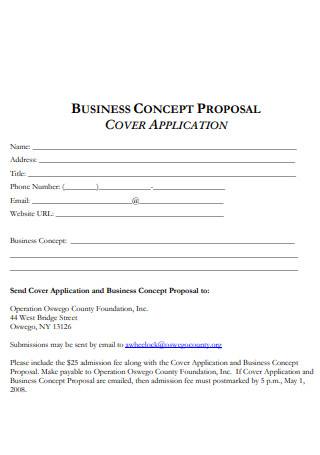
Business Concept Application Proposal
download now -
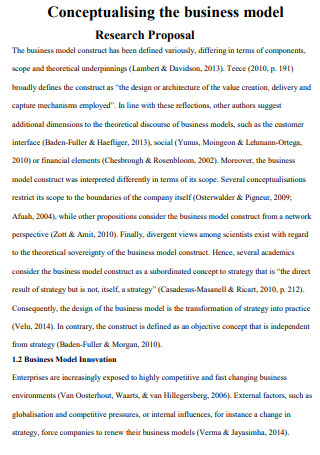
Business Research Concept Proposal
download now -
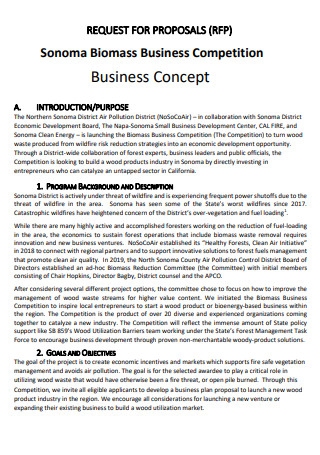
Business Concept Competition Proposal
download now -
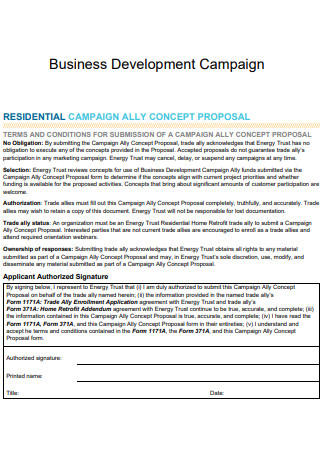
Business Development Campaign Concept Proposal
download now -
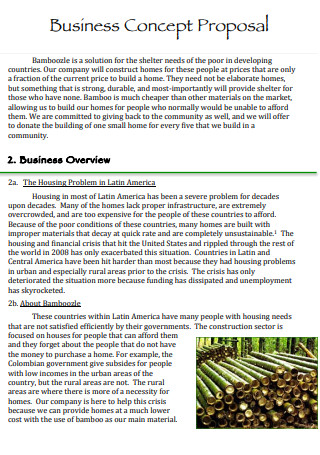
Sample Business Concept Proposal
download now
FREE Business Concept Proposal s to Download
Business Concept Proposal Format
Business Concept Proposal Samples
What is a Business Concept Proposal?
What are the Qualities of a Good Business Concept Proposal?
How to Create a Business Concept Proposal
FAQs
How important is the SMART goal in a business concept?
Is a Business Proposal Letter part of a Business Concept Proposal?
Why is it important for an entrepreneur to learn how to make a business concept proposal?
How does a Business Concept Proposal differ from a Business Plan?
What are common mistakes to avoid?
What makes a strong Business Concept Proposal?
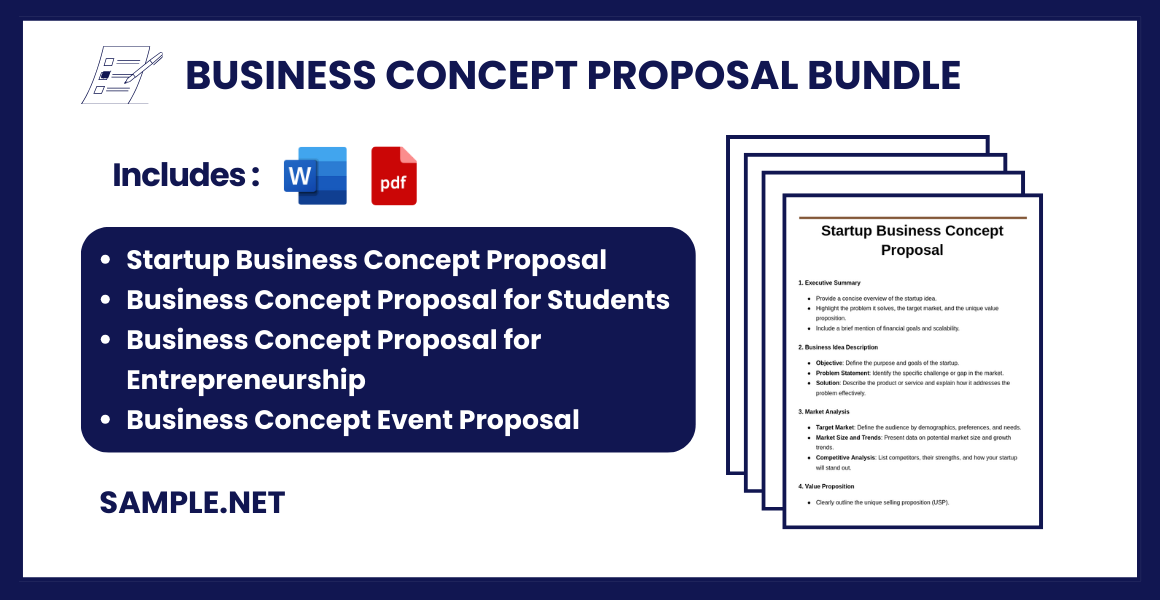
Download Business Concept Proposal Bundle
Business Concept Proposal Format
1. Executive Summary
- A brief overview of the business concept.
- Highlight key points such as the problem it solves, the target market, and the value proposition.
2. Business Idea Description
- Objective: Define the purpose of the business.
- Problem Statement: Outline the specific problem or gap in the market.
- Solution: Describe the product/service and how it addresses the problem.
3. Market Analysis
- Target Market: Identify and define the target audience.
- Market Size: Provide data on potential market size and demand.
- Competitive Analysis: List competitors and explain your competitive advantage.
4. Value Proposition
- Explain the unique selling point (USP) of your product/service.
- Detail how it benefits the customers.
5. Business Model
- Describe the revenue model (e.g., subscription, one-time purchase, etc.).
- Include pricing strategies and potential revenue streams.
6. Marketing and Sales Strategy
- Marketing Plan: Explain how you will promote your business (e.g., digital marketing, ads, partnerships).
- Sales Strategy: Detail how you will acquire customers and maintain relationships.
7. Operational Plan
- Outline key operational activities.
- Include resources, technology, and team roles.
8. Financial Plan
- Startup Costs: Estimate initial funding requirements.
- Revenue Projections: Provide expected revenue for 1-3 years.
- Profit Margins: Highlight expected profitability.
9. Implementation Timeline
- Create a step-by-step timeline for launching and scaling the business.
10. Risks and Mitigation Strategies
- List potential risks and how you plan to address them.
11. Conclusion
- Summarize why this business concept is viable and worth pursuing.
- Provide a compelling closing statement.
What is a Business Concept Proposal?
A business concept proposal is a written document, or presentation, created and presented by the seller or supplier to a prospective client or buyer, offering the sale of the supplier’s or seller’s products and services. Similar to a sales proposal, the business concept proposal provides detailed information on how the products or services can benefit the client or buyer through offering solutions to existing needs or problems.
What are the Qualities of a Good Business Concept Proposal?
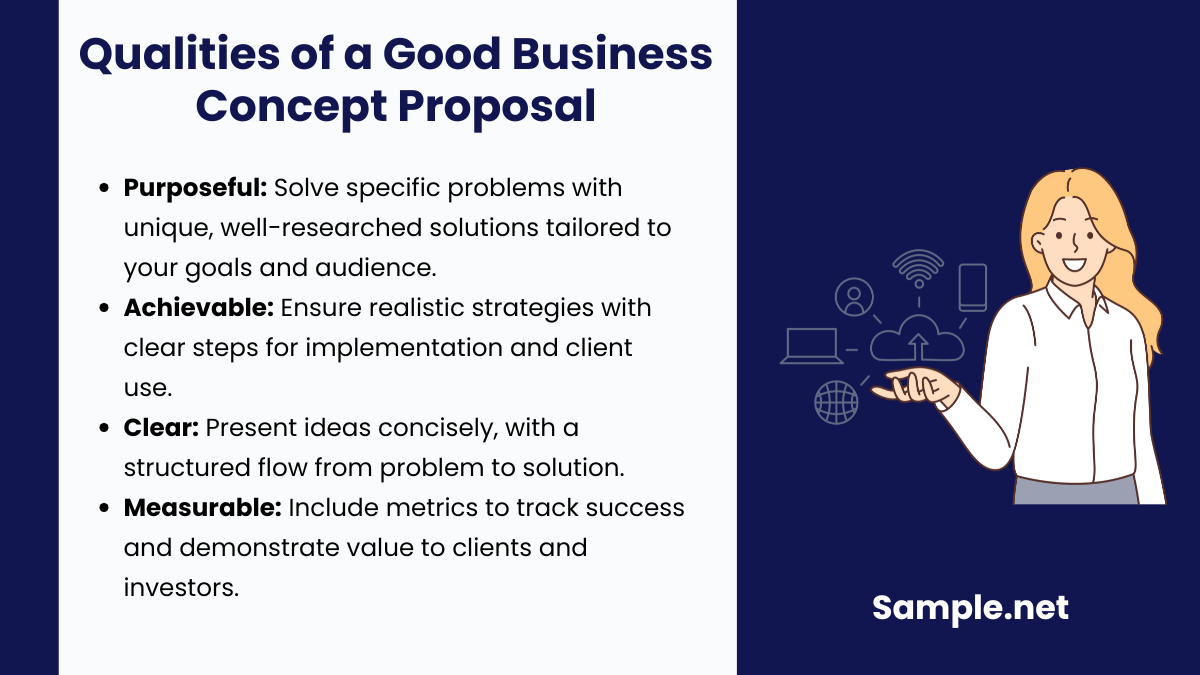
Coming up with a business concept is one step down the road to entrepreneurship. Marketing it and selling it is step two. There are a lot of innovative ideas out there that offer potential solutions to consumers’ or businesses’ needs. The challenge is, how do you get those consumers and businesses to come to the table with you and get them to listen to your presentation, and finally, to purchase your offered solution? An entrepreneur, such as John, may come up with a business concept and have prepared a business concept proposal along with, but how sure is he that it’s good enough for his potential clients? What exactly are the qualities of a good business concept proposal that gets potential investors or clients latched on to? You can also see more on Concept Proposals.
How to Create a Business Concept Proposal
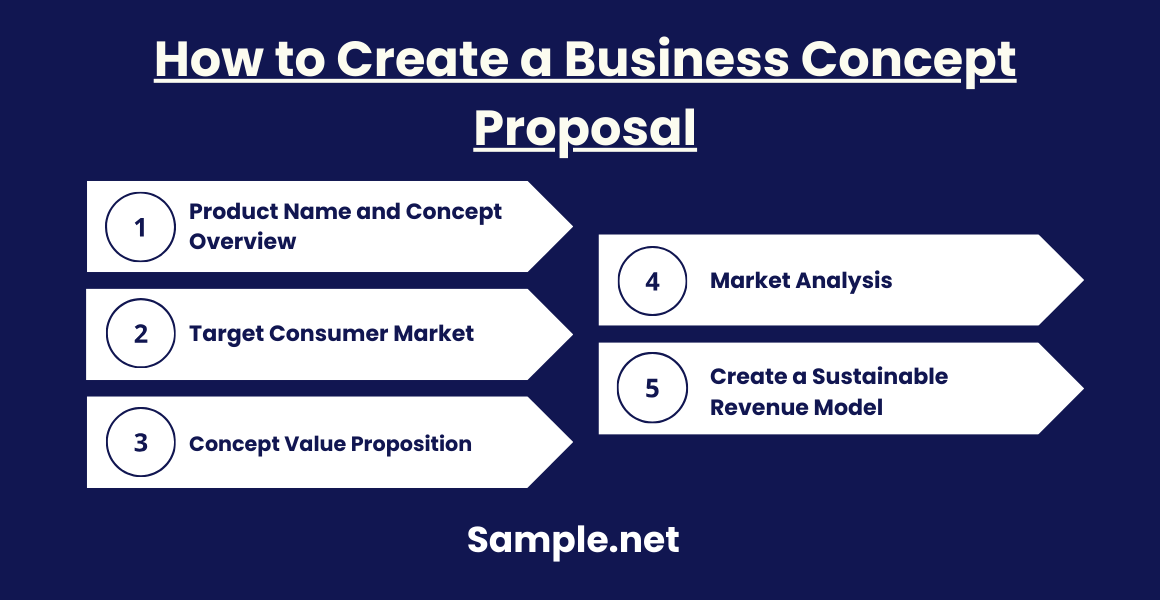
The ultimate goal of a business concept proposal is to draw in potential investors or clients to engage and avail your offered business concept products or services. In our example, John’s goal with his business concept proposal is to attract gym owners and health and fitness enthusiasts to avail and purchase the license to use his health and fitness mobile app. In preparing his proposal, John should note to whom he is specifically doing the basic proposal presentation for, so that he could easily engage them when he is making the presentation. A business concept proposal might be, for all intents and purposes, beautifully written, looks neat and organized, but if it doesn’t have the right key ingredients in it, the whole proposal structure falls flat in its face. Here are some of the key steps on how to create an effective business concept proposal.
Step 1: Product Name and Concept Overview
Write down the name of the business concept product, or service, that you are offering. The name of your product should be unique and well-researched. It should not share any similarities with the product names from other competitors, if there is. It should be able to catch the attention of the consumers, should be easily identifiable, and should be relatable with. The concept overview gives a description of what your product is all about, why is it called that, what is its purpose, and who is it specifically for. You can also see more on Business Lease Proposal.
Step 2: Target Consumer Market
Start by identifying if there is a market need for your product. If there is, then identify who is your target market in this case. The target consumer market is the end users you are targeting to avail your product. These are the group of individuals that have the same set of characteristics that your product is created for. Identifying the target market can be done through classifying consumers according to demographics: age, gender, location, income, lifestyle, et cetera. Having an identified target market can help develop better marketing strategies later on through the business planning process.
Step 3: Concept Value Proposition
This is the part where you explain how your target market will benefit from availing and using your product. A value proposition is what a product, or a service, offers to bring to the consumer once they choose to avail the product, similar to how a marketing strategy also works. In creating the value proposition, describe the features of your product and what are its key benefits. Benefits would be what your clients would take away from using your product. Identify what makes your product unique in the market, and why your potential clients should consider buying your product instead of the competitors’ products. Point out if there are any value-added qualities, such discounts, freebies, product user support, et cetera. You can also see more on Project Executive Proposal.
Step 4: Market Analysis
A market analysis is an overall assessment of the market in terms of qualitative and quantitative. It studies if there is a need in the market for the type of product concept you are producing based on the demographics of your target market. In creating your business concept proposal, present a market analysis showing the trends and volumes of potential end users of the product, including the ease of entry into the market. Also include data on what is the projected annual revenue profit. You can base this off from existing competitors who have a similar product design, or you can make realistic calculated projections based on the number of potential users.
Step 5: Create a Sustainable Revenue Model
From your market analysis, you have already identified an estimated annual profit projection that your business concept will be making. Explain further how the product will earn, or what are the ways that the product will be making a profit. In the case of John’s health and fitness mobile app, one way the app makes revenue is through purchasing the license to use the app, or in-app purchase; through advertisements; and through subscription renewal strategy. Also, the revenue model needs to show how sustainable the business concept is and if it has potential for further growth and development. Cost efficiency also plays a role in the revenue model, how the potential clients and investors save on cost when purchasing and using the product, and what are the other related future expenses, such as product support, product upgrade, et cetera.
A well-crafted Business Concept Formal Proposal bridges the gap between idea generation and actionable business strategies. It ensures clarity, focus, and alignment with market needs, increasing the likelihood of success. Whether attracting investors or mapping out next steps, it serves as a critical tool for turning visions into impactful ventures.
FAQs
How important is the SMART goal in a business concept?
SMART goal means Specific, Measurable, Achievable, Relevant and Time-bound. Specific, meaning that the business concept should have identified a market need that needs to be addressed. It also answers the question of who the product is made for and how will the end user benefit from it. Measurable means how the business concept will be measured against achieving its goal: increase in number of customers or end users and increase in profit revenue. Achievable is how the promised benefit from using the product can be realistically achieved. Relevant means is the business concept appropriate to the current market needs. Time-bound is the timeframe set in achieving the goal of the business concept, which is when it is estimated to reach these number of customers and these number of profit income.
Is a Business Proposal Letter part of a Business Concept Proposal?
Oftentimes, a business proposal letter comes before the actual presentation of a business concept proposal. The proposal letter is used as a way of introducing the business concept to the clients in a hope of establishing a meeting with them to make a presentation. Sometimes it is used as a cover letter attached to the actual business concept proposal document. The proposal letter contains a brief overview of what the business concept is, proposes a date and time of meeting that is convenient for the potential clients or investors, and includes the sender’s contact information details for further inquiries.
Why is it important for an entrepreneur to learn how to make a business concept proposal?
The whole purpose of making a business concept proposal is to generate funds for your business concept or product idea, and that is through the purchase by end users or investors. Learning how to make a proposal is a good first step towards business planning. In fact, it helps establish the necessary capital for the business to start and grow from. Also, it enhances your skill in making business marketing strategies later on. You can also see more on Marketing Proposals.
How does a Business Concept Proposal differ from a Business Plan?
While a Business Concept Proposal is a brief outline of the business idea, a Business Plan is a comprehensive document that includes detailed strategies, financial models, and operational plans.
What are common mistakes to avoid?
Avoid vague ideas, lack of research, unrealistic financials, and overly complex language. Keep the proposal focused and straightforward.
What makes a strong Business Concept Proposal?
Clarity, uniqueness, market research, realistic financials, and a compelling value proposition make a proposal strong and appealing to stakeholders. You can also see more on Joint Venture Proposals.
